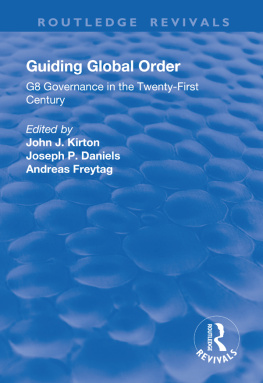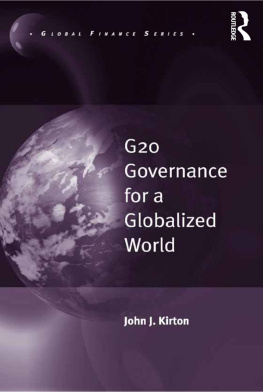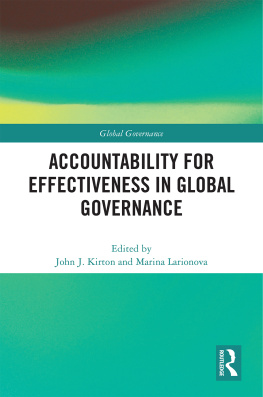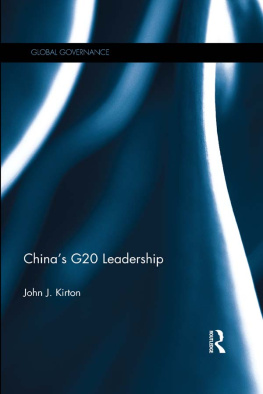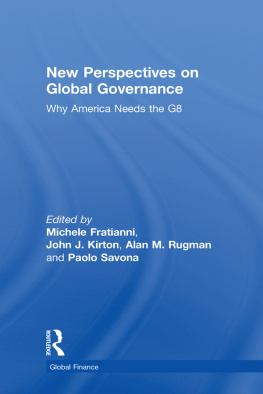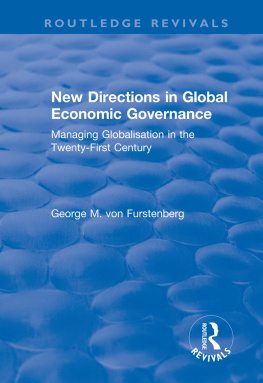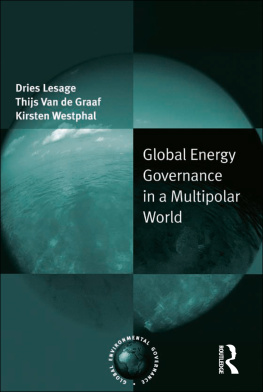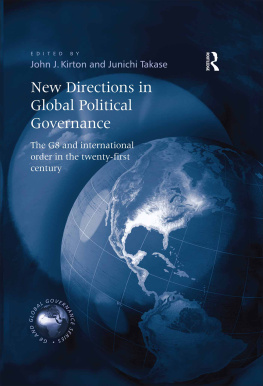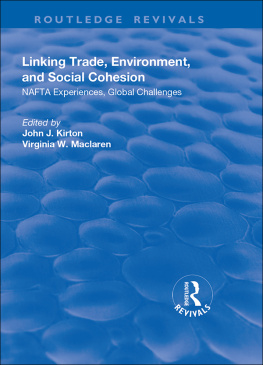GUIDING GLOBAL ORDER
The G8 and Global
Governance Series
The G8 and Global Governance Series explores the issues, the institutions and the strategies of participants in the Group of Eight network of global governance, as well as the other actors, processes, and challenges that shape global order in the twenty-first century. Many aspects of intensifying globalization, once considered domestic, are now moving into the international arena, generating a need for broader and deeper international co-operation, and demanding new centres of leadership to revitalize, reform, reinforce, and even replace the galaxy of multilateral institutions created in 1945. In response, the G8, composed of the worlds major market democracies, including Russia and the European Union, is emerging as an effective source of global governance. The G8 and Global Governance series focuses on the new issues at the centre of global governance, covering topics such as finance, investment, and trade, as well as transnational threats to human security and traditional and emerging political and security challenges. The series examines the often invisible network of G8, G7 and other institutions as they operate inside and outside established international systems to generate desired outcomes and create a new order. It analyzes how individual G8 members and other international actors, including multinational firms, civil society organizations, and other international institutions devise and implement strategies to secure their preferred global order.
Also in the series
Shaping a New International Financial System
Challenges of governance in a globalizing world
Edited by Karl Kaiser, John J. Kirton and Joseph P. Daniels
ISBN 0 7546 1412 3
Hanging In There
The G7 and G8 Summit in maturity and renewal
Nicholas Bayne
ISBN 0 7546 1185 X
The G7/G8 System
Evolution, role and documentation
Peter I. Hajnal
ISBN 1 84014 776 8
The G8s Role in the New Millennium
Edited by Michael R. Hodges, John J. Kirton and Joseph P. Daniels
ISBN 1 84014 774 1
Guiding Global Order
G8 Governance in the Twenty-First Century
Edited by
JOHN J. KIRTON
University of Toronto
JOSEPH P. DANIELS
Marquette University
ANDREAS FREYTAG
University of Cologne
First published 2001 by Ashgate Publishing
Reissued 2018 by Routledge
2 Park Square, Milton Park, Abingdon, Oxon OX14 4RN
52 Vanderbilt Avenue, New York, NY 10017, USA
Routledge is an imprint of the Taylor & Francis Group, an informa business
Copyright John J. Kirton, Joseph P. Daniels and Andreas Freytag 2001
All rights reserved. No part of this book may be reprinted or reproduced or utilised in any form or by any electronic, mechanical, or other means, now known or hereafter invented, including photocopying and recording, or in any information storage or retrieval system, without permission in writing from the publishers.
Notice:
Product or corporate names may be trademarks or registered trademarks, and are used only for identification and explanation without intent to infringe.
Publishers Note
The publisher has gone to great lengths to ensure the quality of this book but regret to inform the customer that previously available online resources are no longer available with this title.
Disclaimer
The publisher has made every effort to trace copyright holders and welcomes correspondence from those they have been unable to contact.
A Library of Congress record exists under LC control number: 00111400
ISBN 13: 978-1-138-63487-9 (hbk)
ISBN 13: 978-1-315-20480-2 (ebk)
Contents
John J. Kirton, Joseph P Daniels, and Andreas Freytag
Andreas Freytag
Juergen B. Donges and Peter Tillmann
George M. von Furstenberg
Razeen Sally
Barbara Dluhosch
Christoph Schwegmann
Klemens Fischer
John J. Kirton
Martin J. G. Theuringer
John J. Kirton
Donald J. S. Brean
Pierre Marc Johnson
John J. Kirton, Joseph P. Daniels, and Andreas Freytag
Helmut Schieber
Donald J. S. Brean is professor of finance and economics at the Rotman School of Management at the University of Toronto. Professor Brean is a graduate of the University of Toronto and the London School of Economics and Political Science. His research deals with international finance, foreign investment, and economies in transition. Recent publications include two edited volumes, Taxation in Modern China (Routledge, 1998), and Research in International Portfolio Management (2000) with John Hull.
Joseph P. Daniels is Associate Professor of International Economics at Marquette University, Milwaukee, Wisconsin, and was Visiting Professor of Economics and International Relations, University of Toronto, in 199798. An established scholar on the G7 Summit process, he has published widely on international economic policy processes. He is co-editor of The G8s Role in the New Millennium (Ashgate, 1999) and Shaping a New International Financial System (Ashgate, 2000).
Barbara Dluhosch has been a lecturer at the University of Cologne since 1998, where she was a research associate sponsored by the German Research Foundation from 1995 to 1997. She is also a Visiting Professor of Economics at the University of Munich for 19992000, and was a visiting researcher at Stanford University from 1995 to 1996, and a research associate at the Bank of Spain in 1994. Her main research interests are international macroeconomics, trade theory, and policy.
Juergen B. Donges is currently Professor of Economics and Director of the Institute for Political Economy at the University of Cologne. He served as Vice-President of the Kiel Institute of World Economics from 1983 to 1989. From 1988 to 1991, Dr. Donges was chairman of the German Commission on Economic Deregulation and has been a member of the German Council of Economic Experts since 1992, serving as chairman since March 2000. He has written extensively on international economic issues.
Klemens Fischer has been Minister Counsellor at the Permanent Representation of Austria to the European Union since 1995. For the two previous years he was a member of the negotiating team for the accession of the Austrian Mission to the European Union in Brussels. He has been a lecturer at the Institute for Communication and Media at the Technical University in Berlin, the Institute for Political Science at the University of Siegen, the Centre for European Studies at Maastricht, and the Rotman School of Management at the University of Toronto. He is the author of Lobbying und Kommunikation in der Europischen Union, published by A. Spitz in Berlin in 1997.
Andreas Freytag is Senior Economist and Managing Director of the Institute for Economic Policy at the University of Cologne. He has been a Visiting Scholar at the Faculty of Economics and Politics at Cambridge University, and has published widely on international economic relations and globalisation. He is currently working on the political economy of international monetary policy.
Pierre Marc Johnson is Senior Counsel with the Canadian law firm Heenan Blaikie. A former premier of the province of Quebec, he has taught law at McGill University and lectures in various fora and participates regularly in many United Nations negotiations. He is an advisor to the North American Commission on Environmental Cooperation, and was vice-chair of the National Round Table on the Environment and the Economy and chair of its foreign policy committee from 1990 to 1997. Dr. Johnson is coauthor of


